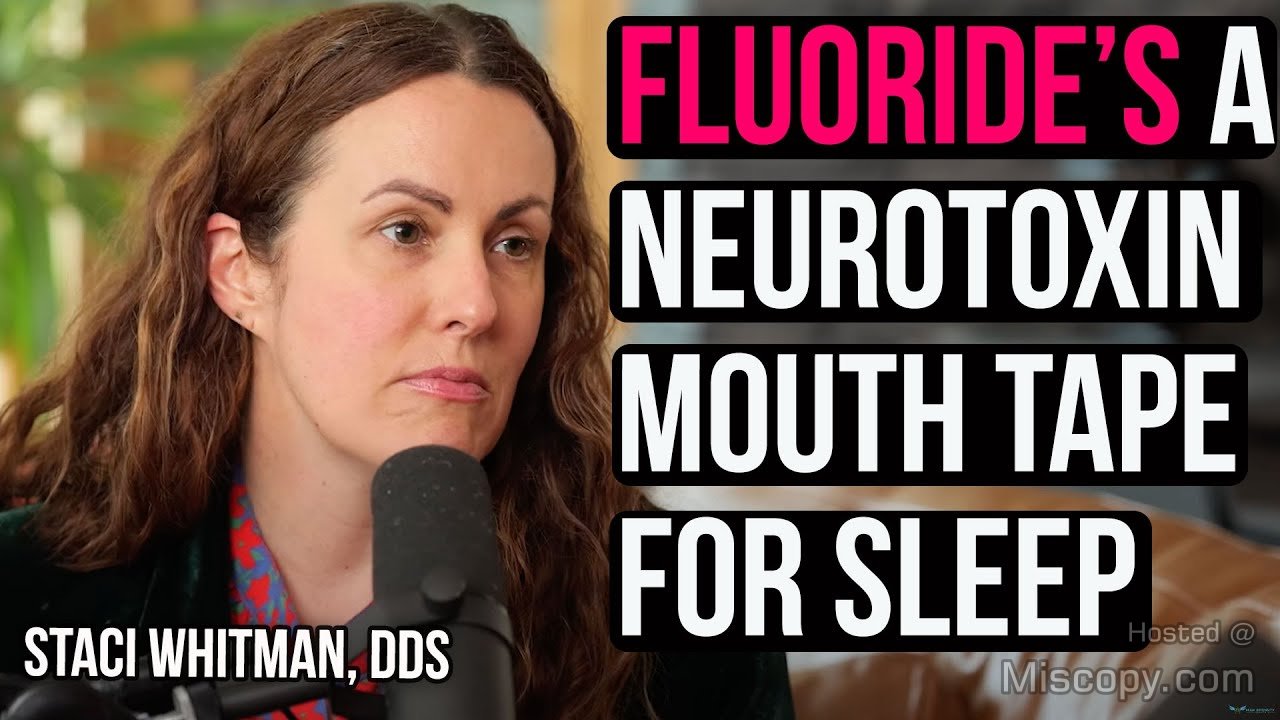Dr. Staci Whitman, a pediatric sleep and airway health specialist, emphasizes the importance of addressing sleep and breathing issues early in childhood to optimize growth and development and avoid chronic sleep deprivation that can lead to behavioral or hormonal problems. She discusses how chewing and mastication are essential for proper facial development and breathing and highlights the importance of a proper bite and how it affects breathing, sleep, and overall health.
Dr. Whitman also cautions against the potential harm of fluoride in water and the need for individuals to filter their water and avoid environmental toxins as much as possible. She discusses the correlation between oral health and overall health, specifically how periodontal disease and gum disease can impact fertility in both men and women. Finally, Dr. Whitman notes the possible causes of tooth decay in children, mentioning microbiome imbalances, nutrient deficiencies, and absorption issues.
Later in the video, Dr. Staci Whitman, DDS, discusses various tips for oral health and hygiene, including tongue scraping and flossing to prevent cavities and leaky gums. She advises against using antimicrobial rinses and recommends using clean and simple dental products. Dr. Whitman also addresses the impact of face masks on oral health and suggests lip taping for chronic mouth breathers. She also advocates for sustainable dental products and warns against bioplastics that release microplastics. Dr. Whitman plans to use social media platforms like Instagram and TikTok to provide education and resources on functional pediatric dentistry.
00:00:00
In this section, it is discussed that the initial idea of putting fluoride in drinking water came from a dentist in Colorado who observed that people in his community had fewer cavities. However, it is now known that fluoride can cause fluorosis, and more importantly, it has been defined as a neurotoxin, with over 70 studies showing that intake of too much fluoride during pregnancy and infancy can impact the IQ and neurodevelopment of children, especially in boys. It is also stated that fluoride works topically, not systemically, and only 3 percent of Europe currently fluoridates their water, with many European countries having removed it due to neurotoxicity concerns and medical ethical concerns regarding mass medicating people without their consent.
00:05:00
In this section, Dr. Staci Whitman explains how her journey to becoming a pediatric sleep and airway health specialist is rooted in her passion for preventing chronic health issues through early intervention. She estimates that up to 90 percent of children have some dysregulated breathing, sleep imbalance, sleep hygiene issue, or breathing dysfunction, and that it’s very rare for her to see a child without any abnormalities. Whitman highlights the importance of addressing these issues early in childhood to optimize growth and development and avoid chronic sleep deprivation that can lead to behavioral or hormonal problems. From an evolutionary standpoint, she discusses how chewing and mastication are essential for proper facial development and breathing, and how a lack of chewing due to ultra-processed diets and macronutrientally deficient diets may contribute to smaller airways, smaller mouths, and the associated health problems that come with it.
00:10:00
In this section, Dr. Staci Whitman emphasizes the importance of a proper bite and how it affects breathing, sleep, and overall health. She suggests that many people, including children, suffer from breathing and airway issues, which can lead to behavioral and growth problems. Dr. Whitman suggests that tongue position and chewing crunchy food can help shape and expand the jawbone to accommodate all teeth. She also highlights research studies and assessments to help diagnose if a child has a structural issue, such as mouth breathing or teeth crowding, that requires orthodontic intervention.
00:15:00
In this section, Dr. Staci Whitman emphasizes the importance of correcting sleep issues by focusing on root cause resolution. Breathing properly is vital to optimal health because of the large number of times we breathe and swallow each day. Breathing issues can cause behavioral problems leading to food addictions and more. Oxygen is the most critical nutrient, and sleep issues, especially in children, can lead to several chronic diseases. Dr. Whitman recommends educating ourselves about airway and sleep health, even if good providers are hard to find. She also addresses the issue of people who cannot breathe through their nose and suggests lip taping as a way to avoid mouth breathing and downstream chronic diseases.
00:20:00
In this section, Dr. Staci Whitman emphasizes the importance of sleep quality and breathing, stating that any amount of snoring is abnormal and a sign of airway obstruction. She suggests going for a consultation to determine available options for correction. She explains that waking up in the middle of the night to urinate may not necessarily be normal, and hormones could be a factor. Parents are advised to observe their children’s sleeping patterns as well, as sleep disturbances can cause behavioral issues during the day, such as hyperactivity and focus issues. Dysregulated breathing, including mouth breathing, could impact neurochemistry and cause an agitated state throughout the day.
00:25:00
In this section, Dr. Staci Whitman discusses the potential harm of fluoride in water and how it was initially put in the water without much safety data. Although fluoride was initially added to the water to reduce cavities, more data has emerged that shows fluoride having some neurotoxicity effects and defined as a neurotoxin. Over 70 studies show that fluoride in early childhood and during pregnancy can impact the IQ of children and their neurodevelopment. Many European countries have removed fluoride from their water, and there is a federal lawsuit in San Francisco regarding fluoride’s impact on IQ and neurodevelopmental issues. Dr. Whitman believes that we should take a pause and look at the data surrounding fluoride’s impact on our health.
00:30:00
In this section, Dr. Staci Whitman, a dentist, explains why she is not a fan of water fluoridation. She believes that the root cause of cavities is not the lack of fluoride but the food people eat and how they breathe. Dr. Whitman recommends using hydroxyapatite, which is in toothpaste and enamel and is safe to swallow because there is no Poison Control label on it. She is not worried about neurotoxicity in children due to nanohydroxyapotype particles, but she thinks that people have gone “fluoride crazy” through drinking water, pharmaceuticals, and processed foods. Dr. Whitman cautions that children can get too much fluoride by swallowing toothpaste and that cavities are still the number one chronic disease globally, even with water fluoridation. She notes that some dental professionals still use fluoride in their practice, but their clients are still getting cavities.
00:35:00
In this section, Dr. Staci Whitman discusses her past pro-fluoride stance and how dentists often rely on the information taught to them in dental school without critically examining the research. She emphasizes the importance of being open-minded and constantly reevaluating science, as new research often conflicts with previously-held beliefs. Furthermore, she points out that the toxicological model is changing, and that the synergistic and non-linear effects of different toxins must be taken into account. Dr. Whitman emphasizes that individuals are bio-individual, and that toxins can accumulate differently in different people. Therefore, she suggests that individuals filter their water and try to avoid environmental toxins as much as possible.
00:40:00
In this section, Dr. Staci Whitman, DDS discusses how mouth breathing can negatively affect the oral and gut microbiome. When breathing through the mouth, the pH level in the mouth becomes more acidic, which creates a perfect environment for harmful anaerobic bacteria to thrive. This drying out of the mouth leads to an increased risk of cavities, and swallowing that bacteria actually seeds the gut microbiome. This microbiome is currently the subject of much research that suggests it impacts systemic health such as autoimmune disorders and Alzheimer’s. Oral health is a gateway to the body, so issues with malnutrition, hydration, and deficiencies can all be visible in patients’ mouths. Additionally, Dr. Whitman highlights the scary finding that bad bacteria from the mouth can release exotoxins and travel along the nervous and blood-brain barriers, leading to diseases like Alzheimer’s.
00:45:00
In this section, Dr. Staci Whitman, DDS discusses the correlation between oral health and overall health, specifically how periodontal disease and gum disease can impact fertility in both men and women. Periodontal disease can cause chronic inflammation, affecting hormone release in women and reducing sperm motility in men. However, regular dental cleanings and treating gum disease can increase blood sugar stability and reduce inflammation. Dr. Whitman also emphasizes the importance of oral microbiome testing and creating personalized treatment plans. Finally, she mentions the potential risk of exchanging pathogenic bacteria through kissing and sharing utensils, highlighting the significance of maintaining good oral hygiene.
00:50:00
In this section, Dr. Staci Whitman, a dentist, explains that the oral microbiome constantly changes as a result of various factors such as eating, drinking, kissing and even getting braces or fillings. The presence of spirochetes, a type of bacteria that antibiotics are usually required to treat, may be the reason some patients suffer from chronic infections. While technologies like ozone are used in dentistry to help with periodontal disease, gum disease, and cavities, it cannot deal with virulent bacteria buried deep within tissue. Dr. Whitman notes the importance of testing, and progressive dentists are resorting to oral microbiome, blood sugar, vitamin D, oat, organic acid, micronutrient, and GI mapping tests to offer more in-depth analysis of oral health for patients. She also advises that the frequency of teeth cleaning depends on individual needs, and a twice-a-year cleaning may not be suitable for everyone. Furthermore, those with gum or periodontal disease should go in for cleaning more frequently until the disease stabilizes, and those with optimal gum and dental health can space out their visits to once a year. Drinking kombucha is not harmful, but its sugar content and acidic nature demand that it be consumed in moderation, preferably with a straw and in a single sitting.
00:55:00
In this section, Dr. Staci Whitman, DDS discusses the possible causes of tooth decay in children, including microbiome imbalances, absorption issues, and nutrient deficiencies like vitamin D, magnesium, and K2. She mentions how nutrient deficiencies might come from maternal gut health and how parents can be blamed for the development of under mineralized teeth even if they correctly practice oral hygiene and give their children nutrient-rich food. Furthermore, Dr. Whitman believes that candida is a prominent issue linked to cavities but suggests that baking soda rinse can help counteract its effects. She notes that she has not seen a correlation between vegan/vegetarian diets and under mineralized teeth, but her observation revealed a high prevalence of such cases in children with vegan moms or vegan/vegetarian diets. She encourages pregnant women to consider adding animal products to their diets for dental development in their children.
01:00:00
In this section, Dr. Staci Whitman discusses the benefits of tongue scraping, including removing bacteria and improving how one tastes food. She also emphasizes the importance of flossing, as cavities often develop between teeth, and it can prevent leaky gums that allow bacteria to enter our bodies. She discourages extreme brushing and flossing and recommends using clean products with few ingredients to support our microbiomes and overall health. Dr. Whitman warns against the use of antimicrobial rinses, such as Listerine, which can damage our oral microbiomes and affect our cardiovascular health.
01:05:00
In this section, Dr. Staci Whitman discusses the effects of wearing face masks on oral health, stating that it could exacerbate underlying issues such as cavities if one is a chronic mouth breather. She suggests testing if you can breathe through your nose comfortably and trying lip taping if needed. Dr. Whitman also discusses the benefits of bentonite clay in remineralization and cleansing teeth and warns about being careful with charcoal as it could be overly abrasive. She also mentions her sustainable and compostable dental floss, Happy Floss, which is made with Biosilk and breaks down within six months in a compost bin.
01:10:00
In this section, Dr. Staci Whitman, DDS discusses the difficulty in finding sustainable alternatives to plastic in dental products, such as bioplastics which break down faster and release microplastics into the environment. She uses floss as an example of single-use plastic that can pose a problem over time, especially for people who use it more than once per day. She also mentions that water flossers are not a perfect solution either, as they end up in landfills and have batteries. Dr. Whitman believes that the industry should be moving towards products that break down into organic matter. She also mentions that she is using Instagram and TikTok to connect with people and offer more education and resources regarding functional pediatric dentistry.





Leave a Reply